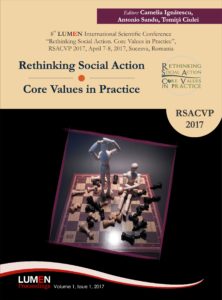The Self-Efficacy of the Emerging Adult, Student or Graduate
The Self-Efficacy of the Emerging Adult, Student or Graduate
Author(s): Mihaela Stomff, Dan Vasiliu
Subject(s): Essay|Book Review |Scientific Life
Published by: Editura Lumen, Asociatia Lumen
Keywords: self-efficacy; age; gender; emerging adult; abandon.
Summary/Abstract: This research aimed to highlight a model of self-efficacy in emerging adults (ages 18/20 – 30 years). We selected a sample of 191 participants, students and graduates. Our goal was to identify the optimum period of intervention to prevent the abandon and capitalization of the latent abilities of these young people. According to a report of the NASOR [14], the rate of academic studies abandon is of 40 per cent. At the same time, there is a significant number of students or graduates who do not succeed to secure a position suitable to their academic training and thus the opportunity of enhancing the development area closest to them. Between the ages of 18 and 26 we noticed a decrease of the records of the perceived self-efficacy, with a minimum between 25 and 26 years. The reasons could be some artefacts coming from their adolescence period, the changing of the paradigm linked to the educational system (different in the academic environment), the tendency towards independence and the confrontation with difficulties in ensuring adequate material conditions, the low perception of the practical utility of the accumulated knowledge. We identified a peak of the high scores of self-efficacy, statistically significant, around the age of 27. The explanation may be due to positive changes such as: the first professional achievements, followed by the emergence of new career opportunities, the future oriented perspective regarding the foundation of a family. We did not ascertain gender regarding differences.
Book: Rethinking Social Action. Core Values in Practice
- Page Range: 855-863
- Page Count: 9
- Publication Year: 2017
- Language: English
- Content File-PDF

